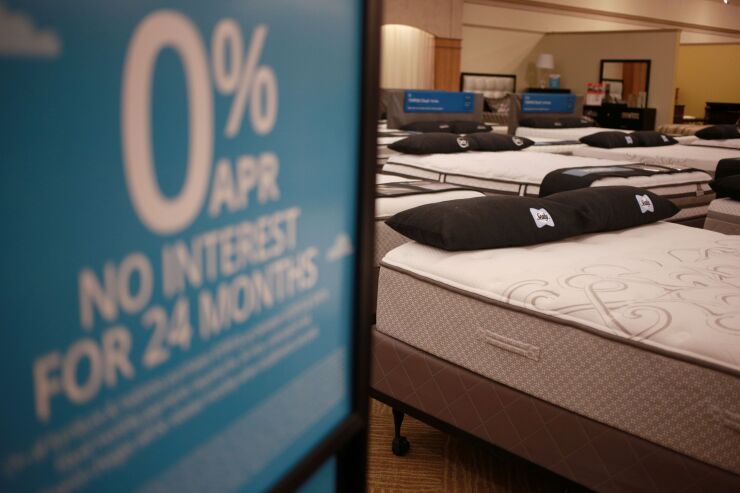Serta Simmons Bedding, which holds $2.4 billion in widely dispersed debt in collateralized loan obligations, is not pleased with a near-default downgrade assigned this month by S&P Global Ratings.
According to a recent statement issued by the highly leveraged mattress company, Serta criticized the ratings agency for overlooking the highly leveraged company’s improving cash-flow and earnings performance when the agency downgraded Serta’s corporate and first-lien debt ratings one notch each to CCC from CCC+ on Dec. 4.
The company asserted in the statement
The ratings action “does not account for the continued trends of improved performance in our cash and EBITDA,” according to a statement from Serta published in Furniture Today. “While we acknowledge their right to do this, we disagree with their outlook.”
The company also states that has no plans to work out its high leverage through a debt restructuring – a possibility raised by both S&P and Moody’s Investors Service in analysis reports this year.
Serta’s response was noted in a weekly CLO market report from Trepp, which wrote of the weak demand from investors for Serta’s debt. “There is no doubt the Serta Simmons debt has been trading in the discount bin,” stated Trepp’s report, which also disclosed that CLO managers such as Marathon Asset Management, LCM Asset Management and Highbridge Capital Management “have been sellers” of Serta’s leveraged-loan debt from their portfolios for the past two months.
The company’s $1.95 billion first-lien term loan (priced at a spread of Libor plus 350 basis points) has been trading below 60 cents on the dollar; its $450 million second-lien loan “has also been trading around $30 recently.”
The $2.4 billion debt is the fourth largest “loan of concern” as tracked by Fitch Ratings.
The first-lien loan is rated Caa1 by Moody’s, which had previously downgraded the loan after the company topped 8x debt-to-EBITDA in April. While Serta benefited from cash balances in excess of $100 million and “solid scale” with revenue over $2.5 billion, Moody’s analysts last spring also had “increasing concerns over the company’s financial structure.”

Serta Simmons, owned by Advent International, is the parent company of Serta International and Simmons Bedding Co., and manufactures bedding under the Serta, Beaurtyrest, Simmons and Tuft & Needle brand names.
In its downgrade report from April, Moody’s wrote that Serta Simmons “has struggled to adapt to a steadily-evolving competitive marketplace” in the retail bedding sector, resulting in senior-management turnover (CEO Michael Traub left the company in April, succeeded by David Swift) and “very high” financial leverage “with little visibility as to how the company can materially strengthen its capital structure in the near term.
“As these conditions persist, the probability increases that the company will pursue a capital markets transaction that we would consider a distressed exchange, and hence a default,” Moody’s report stated.
Serta has an estimated 35%-40% market share in mattress sales in the U.S. and Canada, according to S&P and Moody’s, but has faced increased competition from online mattress sellers including Casper, Purple and Leesa, as well as low-priced competitors from China.
Serta Simmons acquired another online seller, Tuft & Needle, in September 2018 but online sales represent only 10% of total sales, according to Moody’s.
But the company’s “overexposure to Mattress Firm resulted in significant profit decline when it closed 20% of its stores following its reorganization in November 2018,” according to Moody’s.
Serta's debt is also attributable to the aggressive financial practiced tied to its private-equity sponsorship: the company financed a $670 million dividend in 2016.
(This report includes information from Bloomberg)





